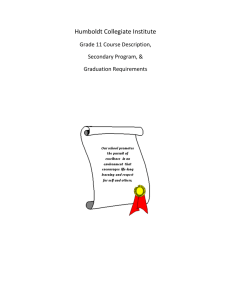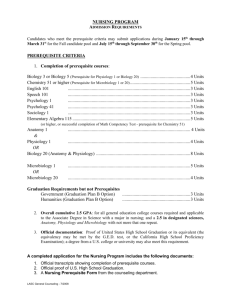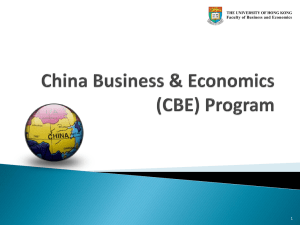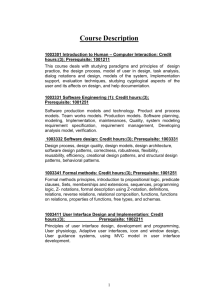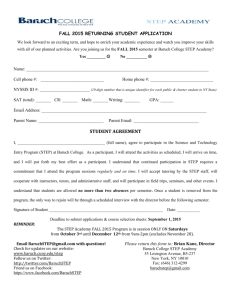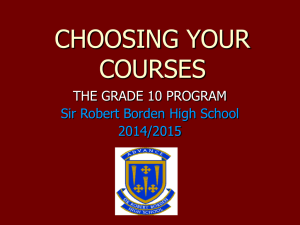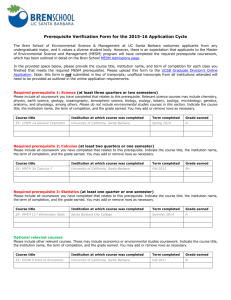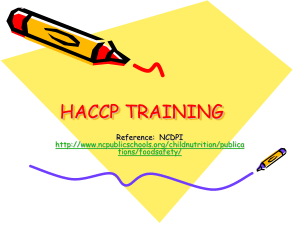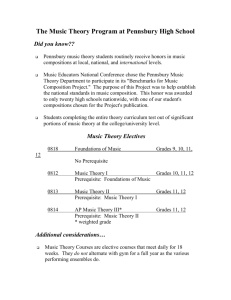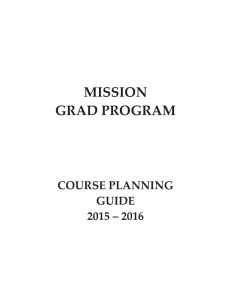Grade 12 Course Descriptions - Humboldt Collegiate Institute
advertisement
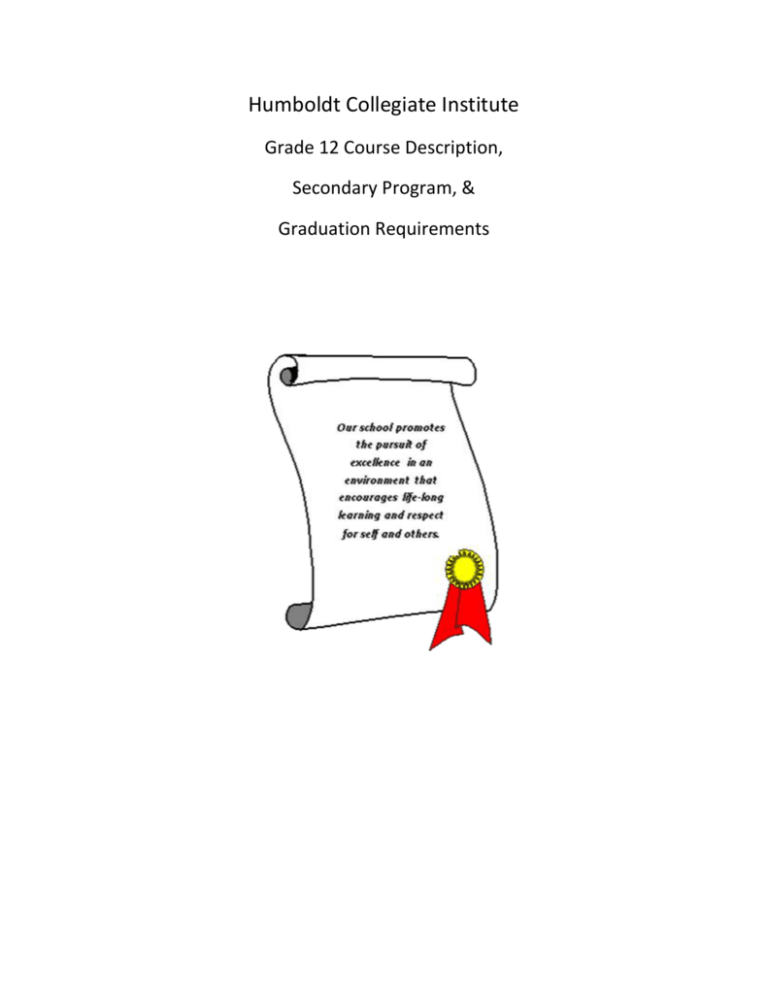
Humboldt Collegiate Institute Grade 12 Course Description, Secondary Program, & Graduation Requirements Secondary Program In order to attain a Grade Twelve standing in Saskatchewan, students must meet certain minimum requirements. This document will make you aware of these requirements and of the courses offered at Humboldt to meet the requirements. Before getting into details, you should be familiar with certain terms used by Saskatchewan Education in reference to requirements for Grade Twelve standing. These terms are as follows: Credit: A one-credit course is developed or approved by Saskatchewan Education and requires a minimum of 100 hours of instruction. All classes in this document are one-credit classes. Required Course: There are certain courses of study all students must take at each grade level. These required courses are clarified further in this document. Required Area of Study: Students are required to take certain courses from an area of study, but have some choice within those areas. Required areas will be clarified in this document. The courses of study from which a student may choose will also be outlined. Electives: Students must take a certain number of courses, but there may be a great deal of choice as to what those courses might be. Courses which are taken simply because a student wishes to meet the minimum number of credits are called electives. However, it should be pointed out, that the choices as to what we can offer as electives are limited by our size. We will attempt to offer courses that meet the interests of all students. Regular courses of Study: Regular courses of study are those ending with a zero. Grade Ten courses are those numbered 10 (example, English A10), Grade Eleven courses are those numbered 20 (example, Chemistry 20), and Grade Twelve courses are those numbers 30 (example, History 30). Modified Course of Study: Modified courses, approved by the Ministry of Education, end with a 1 (ELA A11). They are designed for students who have experienced difficulty in particular areas. These courses are offered in order to provide an opportunity for success for students who must successfully complete Required Courses or courses within a Required Area of Study. General Requirements for Graduation: To attain a Grade Twelve standing, all students must successfully complete 5 credits at the Grade Twelve level and have a total of 24 credits. The compulsory courses for Grade Twelve are: English Language Arts A30 English Language Arts B30 History 30, Native Studies 30, or Social Studies 30 In order to complete their grade twelve requirements, students must also make sure that they have successfully completed the appropriate courses as outlined in the below chart. Program Number of Credits Required Areas of Study Grade 10 Grade 11 Grade 12 English 2 1 2 Mathematics Science Social Science Canadian Studies 1 1 1 1 Specified Areas of Study Grade 10, 11, or 12 1 Science Social Science Health/ Physical Education Arts Education/ Practical and Applied Arts 1 Electives 2 Grade 11 or 12 1 1 2 7 All students are encouraged to meet with a career counsellor when choosing classes. Post-Secondary Math Requirements Students who are considering post-secondary education and taking the Workplace and Apprenticeship pathway should be aware of the opportunities that exist with credits in this pathway of mathematics. Some examples: University of Regina none University of Saskatchewan none SIAST Education (some) Fine Arts Social Work none Dental Hygiene Education assistant Graphic Communications Electrician Workplace and apprenticeship 20 Building Systems Technician (Min. of 60%) Computer Networking Technician (Min. of 60%) Pharmacy technician Workplace and Apprenticeship 30 Students who are considering post-secondary education and taking the Foundations pathway should be aware of the opportunities that exist with credits in this pathway of mathematics. Some examples: University of Regina None Arts Business Nursing (min 70%) University of Saskatchewan None SIAST Agriculture Arts and Science Kinesiology Medical Lab assistant Electrician Pharmacy Tech. Dental Assisting Nursing Course requirement Foundations 20 Foundations 30 Students who are considering post-secondary education and taking the Pre-Calculus pathway should be aware of the opportunities that exist with credits in this pathway of mathematics. Some examples: University of Regina Education (some) Fine Arts Social Work Business Engineering Science University of Saskatchewan none SIAST Engineering Business Electrician Refrigeration and air conditioning Architectural and building tech. Geomatics Technology Mechanical Engineering For more information please visit the link: http://tiny.cc/HCImath Course requirement Pre-Calculus 20 Pre-Calculus 30 MEETING CORE CURRICULUM REQUIREMENTS Total of Compulsory and Elective Courses for 10, 20 & 30 must be greater than or equal to 24. GRADE 10 Compulsory: GRADE 11 Compulsory: GRADE 12 Compulsory: □ English Language A10 □ English Language 20 □ English Language A30 □ English Language B10 At least one of: □ English Language B30 □ Social Studies 10 /History10 or Native Studies 10 □ Pre-calculus □ History 30 □ Foundations □ Science 10 □ Workplace and Apprenticeship □ Math Foundations and Pre-calculus □ Math Workplace and Apprenticeship Social Sciences requirement □ At least one of: Economics 20/30, History 20/21, Law 30, Social Studies 20/21 OR Psychology20/ 30 At least one of: □ Biology 20/30 □ Chemistry 20 □ Physics 20/30 □ At least two Arts Education or Practical & Applied Arts electives at the 10, 20 OR 30 level. □ Wellness/Physical Education: □ At least one of: Wellness10, Phys. Ed. 20, or Phys. Ed. 30 Unspecified Electives: Unspecified Electives: Unspecified Electives: □ 1.__________________ □ 1.________________ (2 of 5 chosen must be at the 30 level) □ 2.__________________ □ 2.________________ □ 1.__________________ □ 3.__________________ □ 3.________________ □ 2.__________________ □ 4.__________________ □ 4.________________ □ 3.__________________ *Grade 10’s must register in 10 classes. . □ 5.________________ □ 4.__________________ □ 6.________________ □ 5.__________________ * Grade 11’s must register in at least 9 classes. □ 6.__________________ □ 7.__________________ * Grade 12’s must register in at least 8 classes. English Language Arts English Language Arts A30 Prerequisite: English Language Arts 20 The organizing focus of English Language Arts A30 is on Canada and Canadian Society. The two major themes are: Canada Diverse Goals and Canada - Diverse Landscapes and Peoples. Students will integrate speaking, listening, writing, reading, representing, and viewing skills as they address the themes in purposeful and challenging ways. English Language Arts A31 Prerequisite: English Language Arts 20 or 21 This course is designed for students experiencing difficulties in English and it can be taken instead of English Language Arts A30. The themes of Appearance/Reality and Identity are used as a focal point for the study of Canadian literature. Students will refine their skills in listening, speaking, writing, and reading. English Language Arts B30 Prerequisite: English Language Arts 20 English Language Arts B30 focuses on human concerns in a global society. The course is organized around global issues and perspectives, and uses contemporary and world literature to examine these issues: The Human Condition - In Search of Self and The Social Experience - Beyond Personal Goals. Skills will be developed as in English Language Arts A30 English Language Arts B31 Prerequisite: English Language Arts 20 or 21 This course is designed for students experiencing difficulties in English and it can be taken instead of English Language Arts B30. The themes of Ambition and Points of View help students study World literature. Students continue to build upon skills in listening, speaking, writing, and reading. Sciences Biology 30 Prerequisite: Health Science 20 or Environmental Science 20 Biology 30 begins with a study of the molecules of life. Building on this biochemical foundation, the structure and function of cells is studied. Heredity and cell reproduction are explored at both an individual and molecular level. All of these previous concepts are incorporated into a study of animal systems: digestive, reproductive, excretory, circulatory, etc. The course also examines the importance of theory in science, using the theory of evolution as an example. Chemistry 30 Prerequisite: Physics Science 20 Chemistry 30 continues where Chemistry 20 left off. The basis of how the course is presented is the same, but students are taken to a more advanced level of chemistry in six specific areas: 1. The solubility of compounds and the calculations involved with solutions; 2. How enthalpy (energy) changes affect chemical reactions; 3. The factors which influence the speed of reactions and the collision theory; 4. Le Chatelier’s principle and equilibrium are investigated in detail; 5. Acids and bases and their effect on the environment are studied; 6. The electrical nature of chemicals is developed and applied to industry and the environment. Physics 30 Prerequisite: Physics Science 20 Physics 30 continues to emphasize the relevance of physics to society, technology, and the environment. This course is more mathematics based than Physics 20. Much of the content will be explored and discovered through hands-on experimentation. The major topics build off of the study of Motion in Science 10. The topics covered are: 1. Mechanics: the study of motion, including velocity, acceleration, vector quantities and forces; 2. Electricity: a study of electricity including circuit analysis; 3. Nuclear Physics: a study of radioactivity and nuclear fission. Earth Science 30 Prerequisite: Environmental Science 20 or Physical Science 20 Students will examine our planet’s geological origins and the geological timescale as a foundation to guide decision making with regards to the use of its mineral and energy resources, the maintenance and remediation of the environment, and response to geological hazards. Hands-on field experiences will enable students to develop visual-spatial reasoning skills and an understanding of the role of Geographic Information Systems. Students will also explore the historical and contemporary significance of Earth Science and related careers. Social Science History 30: Canadian Studies Prerequisite: History 10 This program has been designed to familiarize the student with Canadian history, focusing on: Relationships, Peoples & Paradigms, the Nineteenth Century, the Road to Democracy, External Forces & Domestic Realities, the Forces of Nationalism, and Challenges & Opportunities. In each unit of study, Canadian historical events are introduced and examined. Ultimately, connections are established to identify the relationships between Canadian history and contemporary Canadian realities. Law 30 Law 30 is designed to prepare students to become active, informed, and productive citizens who know and understand their legal rights and responsibilities. Students develop an understanding of the concept of law and learn that the law reflects, and is shaped by, society’s values and attitudes regarding social and human relations. Throughout, students develop their understanding of the abstract nature of law through study of the concrete application of law on current legal issue in Canada and the global community. Native Studies 30 Prerequisite: History 10 or Native Studies 10 Native Studies 30 is intended to be a continuation in the journey to understanding Aboriginal issues in Canada. This course is intended to help students complete the curriculum objectives set out by Saskatchewan Education, but will be of particular interest to students of Canadian Studies. First Nations issues, both past and present, are very significant due to the increasing Aboriginal population of Canada, particularly in the West. It is in all of our interests, Native and Non-native alike, that the Aboriginal community continues on a path of economic and socially productive participation in Canadian society. Psychology 30 Suggested Prerequisite: Psychology 20 Psychology is the systematic study of human behaviour and experience. The focus of this course is human development. Developmental psychology is the field of psychology that focuses on human development across the life span. Students will learn about human growth and changes in behaviour associated with age, including the various stages of development from infancy through childhood, adolescence, adulthood, and old age. Psychology 30 will include a mandatory unit on preconception (that is, making choices regarding having children/becoming a parent) to birth (including the lifestyle choices of parents-to-be and how these choices affect the fetus/child). It also includes several optional units to allow the teacher to best respond to the needs of their students. Mathematics Math Workplace and Apprenticeship 30 Prerequisite: MWA 20 This course is designed to provide students with the mathematical understandings and critical-thinking skills identified for entry into the majority of trades and for direct entry into the work force. Topics include logical reasoning and problem solving strategies, limitations of measuring instruments, trigonometry, solving problems using the properties of various shapes, transformations, the purchasing of a vehicle, analysis of a business’ finances, linear relations, central tendency, percentiles, & probability. Based upon the type of post-secondary program and career choices made by students, this option is intended to meet the needs of approximately 30 – 40 percent of the student population. The mathematical knowledge and skills acquired through this course will be useful to students in many applications throughout their lives in both work and non-work settings. Math Foundations 30 Prerequisite: MF 20 This course is designed to provide students with the mathematical understandings and critical-thinking skills identified for entry into post-secondary programs that do not require the study of theoretical calculus. Topics include: financial decision-making, logical reasoning, counting principles, probability, polynomial functions, periodic functions, logarithmic and exponential functions Math Pre-calculus 30 Prerequisite: MP 20 This pathway is designed to provide students with the mathematical understandings and critical thinking skills identified for entry into post-secondary programs that require the study of theoretical calculus. Topics include angles, the unit circle and trigonometry, graphing trigonometry functions, solving trigonometry equations, trigonometric identities, function composition, transformations of functions, reflection of functions, relations and inverses, logarithms, radical & rational functions, polynomials, permutations, & combinations. Based upon the type of postsecondary program and career choices made by students, this option is intended to meet the needs of approximately 10 - 30 percent of the student population. The PreCalculus pathway meets the needs of students pursuing careers in science-related areas and areas of study that are math intensive. Calculus 30 Calculus is a branch of mathematics, developed from algebra and geometry. It has two main branches; the first is differential calculus, which studies the rate of change in one quantity relative to the rate of change in another quantity. This can be illustrated by the slope of a line. The second is integral calculus, which studies the accumulation of quantities, such as areas under a curve, linear distance traveled, or volume displaced. Today, calculus is used in every branch of the physical sciences, in computer science, in statistics, and in engineering; in economics, business, and medicine; and as a general method whenever the goal is an optimum solution to a problem that can be given in mathematical form. Arts Education and Practical and Applied Arts Accounting 30 Prerequisite: Accounting 20 Accounting 30 reviews principles learned in previous courses. The main focus, however, is accounting for management decision-making rather than the accounting cycle studied in earlier courses. The computer is used to learn analysis techniques based on accounting records. Band 30 Prerequisite: Prior participation in a band course This course is to further improve skills: breathing, tone quality, intonation, articulation, range development and reading skills, taught in Grade 9. The class includes traditional band literature available in a wide variety of styles and periods. Students grow as educated music performers, both individually and collectively encouraging confidence in individual and ensemble playing. Music is chosen from repertoire of Grade 3 to 5 levels. There are traditionally 2 concerts and 1 festival performance per year. Career and Work Exploration A30 and B30 These courses consist of both classroom and workplace learning. Career and Work Exploration at the grade twelve level maximizes the opportunities for students to access the workplace. These courses offer opportunities for students to experience career choices and to develop entry skills in a workplace setting. Students will develop a portfolio that can be used as a tool to enter the work force. At the A30 and B30 level you will study all aspects of preparing for the work force including resumes, applications, interviews and requirements needed for careers you are interested in your future. Work placements will be a joint decision based on the student’s abilities and preferences as well as upon availability of a job site. You will work from 1:30 at your placement at least four days a week with Monday usually being an in-class session at HCI. (Students enrolled in work experience are registered in both Career and Work Exploration A30 and B30 and should receive two credits upon completion.) Choral 30 Choral class is for anyone who enjoys music and singing in a group setting. Students learn the basics of vocal technique, how to read music, ear training and listening skills. Choir students explore a wide range of choral repertoire representing different styles of music, historical periods, cultures and languages. Students learn how to harmonize and develop the expressive techniques of performance. The program relies on active student participation making regular attendance both at rehearsals and performances mandatory. The choir performs numerous times during the year at school and community functions and usually competes each spring at the Humboldt Music Festival. The choir program strives to give each student a deeper appreciation for performing arts and provides meaningful musical experiences for all those involved. Christian Ethics 30 This program explores how Christianity has guided our need for self-understanding and how it has given meaning to life, death, and belief. The understanding of relationships and commitments is also studied, as is the contributions of various world religions and spiritualties to our understanding of self and others. Clothing, Textiles, and Fashion 30 This curriculum is designed to create awareness of the role of clothing, textiles and fashion in our daily lives. Modules are developed for the student who has the desire to learn to sew and/or design clothing and textile products. Modules will provide the student with the opportunity for achievement and success through a combination of theory and practical experiences. Modules explored in this curriculum include advanced successful sewing and industrial techniques, clothing-a powerful resource, textile application, language of fashion, fashion industry, and you as the fashion designer and other related careers. Students will develop a knowledge base that will enable them to develop buying practices when shopping for clothing and textile products. They will cultivate practical sewing skills that can be used in their daily lives. Students will gain knowledge of the changes in the production of clothing and in the textiles industries and how they influence the lives of people today. They will explore career opportunities that may lead to successful employment in the areas of clothing, textiles and fashion. This curriculum expands upon the objectives outlined in Clothing, Textiles and Fashion 10. Drama 30 Drama is a class for all those who love to perform. Students will have the opportunity to develop self-confidence and acting skills as they do improvisation, storytelling, scriptwriting, mime, dance, and many other aspects of drama. Students will also learn about drama as they view others acting, both on stage at HCI and as we have opportunity, viewing dramatic performances elsewhere. Students will also have the chance to learn technical theatre by applying their skills to actual dramatic performances using sound, lighting, makeup, costume design, set design, etc. Drama class explores the role of drama and theatre in culture from a historical setting to contemporary culture. Grade 10, 11, and 12 drama students are combined in this class working as grade groups, creating individuals projects, and as an entire class. Food Studies 30 Food Studies focuses on essential knowledge and understanding of foods and nutrition. It stresses the importance of making healthy food choices in order to promote the well-being of individuals and families. It also aims at developing self-reliance, independence and positive social skills, as well as teaching basic life skills and knowledge that all students need. The curriculum provides a balance between academic and practical food preparation experiences. The major focus of the course includes a study of the following topics: Canada’s Food Guide, food through the life cycle, keep it cold, protein foods, make mine quick and healthy, the science of nutrition, the Canadian food mosaic, international cuisine, the world of soups, sauces, creative baking, entertaining with food, food for special occasions, food preservation, food additives, current food issues and exploring careers in the food industry. Information Processing 30 Recommended that Students have Info. Proc. 20 Information processing is the study of turning ideas into a product, revising the product, and distributing the information in product form to an audience that provides feedback. The main tool used is the computer. The main focus is on managing the information processing cycle, exploring the best way to produce and store products for personal and business use. There is a strong video production component as well as advanced web page production and advanced desktop publishing. Music 30 Music 30 is a class for students who have successfully completed Guitar 10. This course takes music a step further by increasing knowledge of music theory and its application to various instruments. Students may develop further skills in guitar and explore other instruments also through independent and group study. Song-writing and mastery of various musical techniques may also be included. Practical and Applied Arts Survey 30 (IA) Suggested Prerequisite: Practical & Applied Arts Survey 20 Students in Industrial Arts 20 and 30 have an opportunity to apply their knowledge of process learned in Industrial Arts 10 to a project of their choice. Students are given a portfolio assignment which guides them through the design process which includes designing a project on the computer, doing a cost and materials analysis, the development of a proposal, and the construction of the project(s). The process gives students an opportunity to develop critical thinking skills, positive work habits, and safe tool and shop orientation skills. Many projects have been completed in this course including chairs, tables, fishing shacks, and even Visual Art 30 Suggested Prerequisite: Visual Art 20 Students are encouraged to use their skills in drawing and painting to express themselves visually and to develop a personal style. Originality is important. The last half of the semester is made up of contract work in which senior students work on projects of their choice. a sketch book is required for out-of-class drawing and generating ideas. Physical Education Physical Education 30 (female and male) Physical Education 30 continues with the concepts acquired in Wellness 10. The aim of the Physical Education program is lifelong participation. Our desire is to allow students the opportunity to develop skills and to participate in a safe, positive environment and in turn foster a positive attitude towards a lifetime commitment to physical activity. Our goals in the Physical Education 20/30 program are: concept-based skill development; development of positive attitudes focusing on physical activity, fitness, self-concept, relationships with others, social behaviour and personal and group safety; and a lifestyle oriented to overall well-being. Unspecified Electives French 30 Prerequisite: French 20 French 30 students continue to use their personal experiences and the knowledge of the language learned in the previous years to improve their level of communication in the language.
